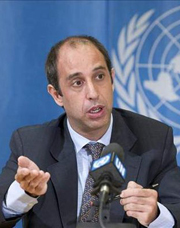In March 2010, the United Nations Special Rapporteur on human rights in Burma, Prof. Tomas Ojea Quintana, urged the UN to establish a Commission of Inquiry with a specific fact finding mandate to address the question of war crimes and crimes against humanity in Burma. Quintana speaks to The Irrawaddy’s reporter, Ba Kaung, about how he sees the recent political and economic reforms in Burma affecting the country’s human rights situation. In this interview made on Friday evening when US Secretary of State Hillary Clinton concluded her historic visit to the country, the UN rights envoy said that the problem of impunity persists in Burma despite its reforms, and lack of independence can also compromise the performance of state-backed National Human Rights Commission in the country.
 |
| Tomas Ojea Quintana |
Question: What is your opinion on US Secretary of State Hillary Clinton’s trip to Burma from the perspective of human rights issues in the country?
Answer: I welcome the visit of US Secretary of State Hillary Clinton to Myanmar, and I hope this visit will encourage the government to face serious human rights shortcomings.
At this juncture, one of the most important decisions for the government to take, definitely, is the release of all political prisoners. This is a decision that, unlike the situation in border areas and others that may require additional measures, depends only on the decision of the President. The President of Myanmar has the authority, according to the Constitution, to issue amnesties to prisoners without any other condition.
And this decision cannot wait any longer. We must never forget that political prisoners are those women and men who offered their lives and liberty, their torture and their suffering throughout the years, to force the former military government to accelerate the so-called Seven Step Road Map to Democracy, a road map that, until the 2007 Saffron Revolution, the military government had been postponing and delaying.
I hope, therefore, that the President of Myanmar takes the opportunity that the visit of the US Secretary of State offers, and responds to what the whole international community has been calling for: to put an end to the arbitrary detention of hundreds of political prisoners.
The new Government of Myanmar, all political parties, and above all the people of Myanmar, they all owe these men and women behind bars the opportunity for a meaningful democratic transition, and the prospect for a better future.
Q: Are you worried that the US approach to Burma might be premature given the unresolved ethnic conflicts and the continued detention of many political prisoners?
Answer: Myanmar is going through an unprecedented momentum in its history, which may bring important opportunities. Bilateral relationships, then, may strengthen these opportunities, but I believe that these relationships should include human rights in the agenda, and the US Secretary of State has been clear on expressing concern for the detention of political prisoners and the situation in border areas.
Q: There is much emphasis on some reforms the Burmese government has recently taken. To what extent have these reforms improved the human rights conditions in Burma?
A:The government has taken clear steps towards reform, and we need to encourage them to continue on this direction. Now, again, why is it that political prisoners are seen to be the subject of bargaining with the international community?
The Association of Southeast Asian Nations has decided that Myanmar will chair the organization in 2014, but why is it that hundreds of political prisoners are still in jail, prisoners, most of whom suffered extreme abuses in Myanmar prisons?
Restrictions on civil and political rights seem to be gradually evolving, but the upcoming by-elections (although there is no formal announcement yet) will test to what extent this is translated into reality.
The initiative for peace talks is of course welcome, but there are specific and very serious issues in respect to the conflicts that need immediate and strong measures. I am talking about the use of children, and forced labor by the military.

